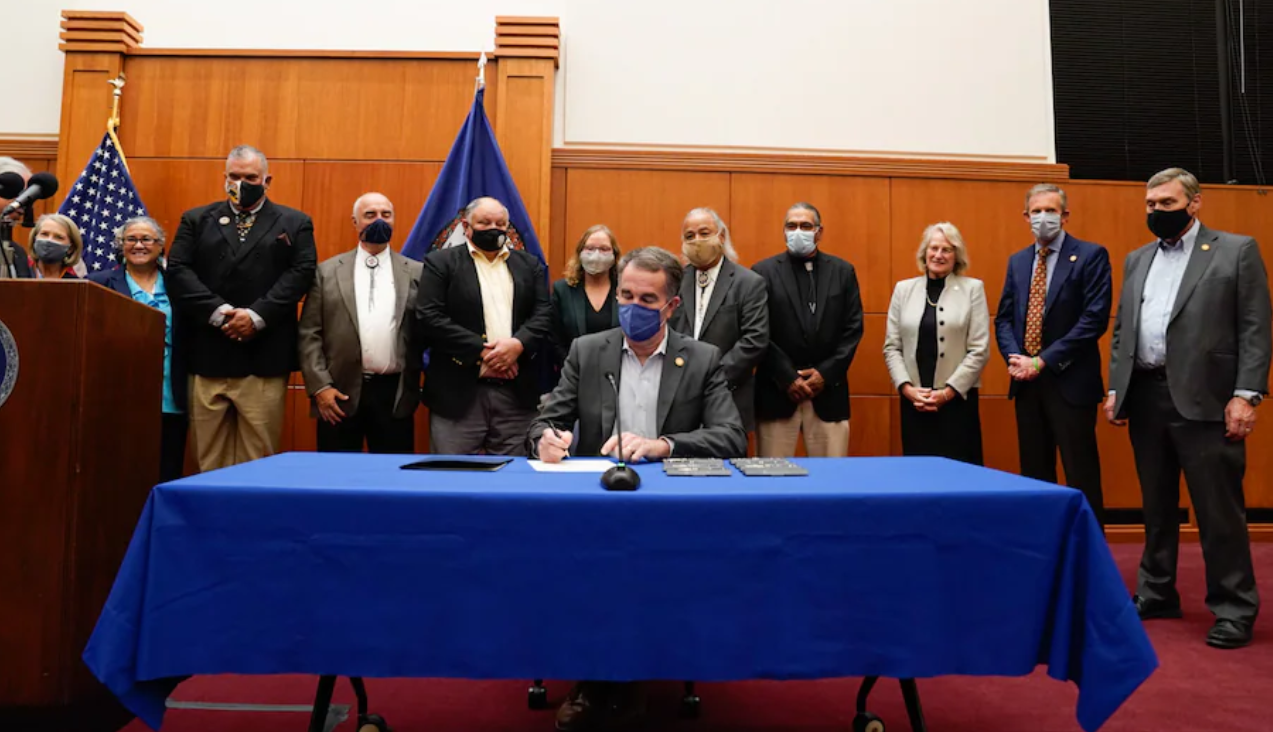On November 18, 2021, Virginia Governor Ralph Northam signed an Executive Order that represents a major step in advancing the sovereignty of federally recognized Tribes in the Commonwealth and brings Virginia closer to being the first in the nation to respect indigenous people’s right to free, prior, and informed consent. Cultural Heritage Partners is pleased to represent six federally recognized tribes in their advocacy on this issue. It is our hope that this Order serves as a marker to future Administrations in the Commonwealth and inspires similar actions in other states.
The Order affirms the Commonwealth’s obligation to consult with tribes before granting state permits for projects that may impact their cultural, historic, and environmental interests. The Order also creates the position of Tribal Ombudsman, whose role is to liaise with state agencies and tribes to ensure development of meaningful consultation policies. Significantly, the Order establishes a process for the Ombudsman, in consultation with Tribal Nations, to recommend to the Governor certain circumstances under which tribal consent should be required before issuing permits. Virginia is the first state in the nation to include a consent clause.
While proposed development projects involving federal funds or permits require federal agencies to consult impacted tribes, Virginia lacked a similar requirement for state agencies to consult tribes on state-permitted projects. Tribal consultation is a win-win for Tribes and for the developers who seek state permits. Tribes will have an early opportunity to raise concerns about potential projects during the planning process, when developers can more easily make design changes to minimize and mitigate impacts. Early outreach and collaboration with Tribes will provide developers with more certainty and predictability in the permitting process and help them keep their projects on time and on budget, while also respecting environmental, historic, and cultural values. For example, had Virginia’s Department of Environmental Quality consulted with the Monacan Indian Nation before it permitted a project that would disturb the burials of Monacan ancestors, it could have required changes to the project early on and avoided a very public and costly battle between the Monacan Indian Nation and the James River Water Authority. See, e.g., https://vimeo.com/461193500.
The Order has received bipartisan support.
The Treaty of Middle Plantation, signed in 1677 and still binding today, established a government-to-government relationship between the Tribes and Virginia. This Order is an important step in furthering that relationship and keeping Virginia’s promise that the Governor would consider and redress harms to perpetrated against the Tribes. The Tribes look forward to working with the General Assembly this winter to codify provisions of the Order and to encourage Virginia to follow through on its Treaty obligations.
There are seven federally recognized tribes located in Virginia. The Pamunkey Indian Tribe received federal recognition in 2015. Six tribes received federal recognition in 2018 through the Thomasina E. Jordan Indian Tribes of Virginia Federal Recognition Act of 2017: the Chickahominy Indian Tribe, the Chickahominy Indian Tribe- Eastern Division, the Monacan Indian Nation, the Nansemond Indian Nation, the Rappahannock Tribe, and the Upper Mattaponi Indian Tribe.
Read More:
- Executive Order 82: Consultation with Federally Recognized Tribal Nations for Environmental and Historic Permits and Reviews, Commonwealth of Virginia, Office of the Governor, November 18, 2021
- Governor Northam Directs State Agencies to Consult with Tribal Nations, Affirming the Commonwealth’s Commitment to Government-to-Government Cooperation, Commonwealth of Virginia, Office of the Governor, November 18, 2021
- New rule requires consultation with Virginia tribes about development, The Washington Post, November 18, 2021
- Va. Order Gives Tribes More Power Over State Permits, Law360, November 18, 2021
- Governor Northam Directs State Agencies to Consult with Tribal Nations, Affirming the Commonwealth’s Commitment to Government-to-Government Cooperation, Indianz.com, November 18, 2021
- Northam Executive Order requires consultation with Tribal Nations on permits for environmental, cultural and historic resources, WRIC, November 8, 2021
- Executive order: State permitting agencies must consult Tribal Nations, WHSV, November 18, 2021
- Northam orders state to consult with tribal nations when considering permits, Virginia Mercury, November 18, 2021
- Tribes and advocates applaud Northam’s executive order, NPR, November 19, 2021
- Editorial: Virginia’s tribe get a seat at the table, Culpeper Star Exponent, December 2, 2021
Photo by: Jack Mayer/Office of the Governor of Virginia
